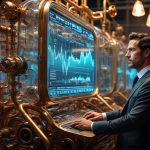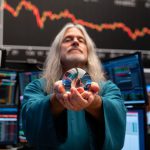
Future Market Insights: Embracing Trends and Navigating Manipulation
May 7, 2024
Introduction: Beyond Absolutes, a Dynamic Perspective
In the realm of financial markets, it is imperative to recognize that the focus should not be solely on absolute targets. While setting goals is necessary, the Federal Reserve’s influence on market direction cannot be understated. They navigate the delicate balance between allowing natural forces to shape the upward trajectory and controlling the downward path. Thus, traders must accept that the Fed’s actions may result in market pullbacks, from mild to wild, as part of their strategic game.
The Fed’s manoeuvres may seem dangerous to the uninitiated, but they are calculated moves that ensure the safety of their interests and those who understand trend investing. As the renowned inventor and visionary Nikola Tesla once said, “The present is theirs; the future, for which I really worked, is mine.” This quote captures the essence of our approach—looking beyond the immediate fluctuations and embracing the future trends that shape our world.
The Illusion of Expertise: A Critique of Conventional Wisdom
In the financial arena, it is expected to encounter self-proclaimed experts who claim to possess unparalleled insight. However, their predictions often fall short, as evident in the case of Warren Buffett’s recent missteps in the airline industry. The oracle of Omaha now resembles the jackass from Timbuktu, selling airline stocks at the bottom. This is not an isolated incident, as many top hedge fund managers and money managers have made similar errors.
Their success is not inherent but rather a product of the credit bestowed upon them by the masses. Without this blind faith, they are no different from con artists waiting to be exposed. Plato, the ancient Greek philosopher, understood the fallibility of human knowledge and the dangers of blind trust. In his allegory of the cave, Plato describes individuals who mistake shadows on the wall for reality. Similarly, investors must question the projections and narratives presented by these so-called experts, recognizing their limitations.
Mark Twain, the celebrated American author, offers a witty perspective on the matter. He is known for his quote, “It ain’t what you don’t know that gets you into trouble. It’s what you know for sure that ain’t so.” This insight underscores the danger of holding unwaveringly to experts’ opinions, as their knowledge may prove false. As investors, we must remain vigilant and form our own judgments.
Navigating the Markets: Adaptation and Self-Reliance
At Tactical Investor, we recognize the dynamic nature of financial markets and adapt our strategies accordingly. We do not rely on rigid systems but instead focus on understanding the underlying forces driving market behaviour. The markets reflect participants’ collective fears and desires, often driven by manipulation and emotion rather than rational analysis. Hermes, the ancient Greek god associated with commerce and communication, embodies the qualities of adaptability and resourcefulness.
Hermes once said, “I move in ways that are hidden, and I bring to light what was hidden.” This quote captures the essence of our approach—navigating the markets with agility and uncovering hidden opportunities. We do not follow the crowd but instead strive to understand the motivations and actions of smart money. By embracing self-reliance and independent thinking, we can break free from the herd mentality that often leads to subpar investment decisions.
Understanding Manipulation: A Game of Shadows
It is undeniable that financial markets are subject to manipulation on an unprecedented scale. Buyers emerge from the shadows during pullbacks, indicating the presence of influential players. This manipulation will only intensify, reaching levels once deemed unbelievable. However, rather than trying to decipher the intentions behind every move, it is more productive to accept this reality and formulate a plan.
The underlying theme behind every disaster and tragedy is the increase in the money supply, often under the guise of aiding the populace. Yet, the poor get poorer, and the former wealthy join their ranks. As investors, we must recognize this trend and mimic the actions of smart money, just as Hermes, the cunning messenger of the gods, navigated between the mortal and divine realms.
Tesla, a visionary ahead of his time, understood the importance of self-observation and critical thinking. He once said, “My brain is only a receiver. In the Universe, there is a core from which we obtain knowledge, strength, and inspiration. I have not penetrated into the secrets of this core, but I know that it exists.” This quote encourages investors to question, observe, and think independently, moving beyond the shadows cast by so-called experts.
Breaking Free from the Cycle of Fear: A Platonic Perspective
Fear is a powerful emotion that often clouds judgment and impedes rational decision-making. Investors must engage in self-observation and introspection to break free from this cycle. Plato’s allegory of the cave provides a framework for understanding our limited perspective. We must recognize that our perceptions are often shaped by external influences, and only through self-reflection can we gain a clearer view of reality.
Like awakening from a dream, Plato’s allegory encourages investors to question their assumptions and biases. Observing our emotional and intellectual functions, we can identify patterns and improve our trading skills. As Plato wrote, “The first and best victory is to conquer self.” Overcoming fear and embracing self-awareness empowers investors to make more informed decisions, moving beyond the shadows of doubt and uncertainty.
With his signature wit, Mark Twain offers a practical perspective on self-improvement. He is known for saying, “The secret of getting ahead is getting started.” This insight underscores the importance of taking action and learning from our mistakes. As investors, we must embrace the journey of self-discovery and continuous improvement to break free from the cycle of fear.
Beyond Why: Embracing the Trend
One of investors’ common pitfalls is the tendency to focus on the “why” behind market movements. Instead of seeking explanations, it is more productive to accept the situation and position yourself accordingly. The masses often seek guidance from so-called experts, only to regret their decisions when things go awry. This cycle of reliance and disappointment repeats itself, with individuals failing to learn from their mistakes.
Hermes, the guide and messenger, once said, “I show things that are to be, and I show things that might be.” This quote captures the essence of our approach—looking beyond the immediate circumstances and recognizing the potential for change. We must embrace the trend and adapt our strategies, for as the saying goes, “The trend is your friend.”
Market Pullbacks: Opportunities in Disguise
The recent market sell-off presents an opportunity for investors to diverge from the crowd. While many will cry bloody murder, it is essential to remember that every pullback is a chance to join the ranks of the smart money. The masses tend to regret their inaction during previous crashes, yet they repeat the same mistakes, trapped in a cycle of regret and missed opportunities.
As Tesla, the embodiment of innovation, once said, “The day science begins to study non-physical phenomena, it will make more progress in one decade than in all the previous centuries of its existence.” This quote encourages investors to look beyond the tangible and recognize the impact of non-physical factors, such as market sentiment and crowd psychology, on investment decisions. By embracing a holistic perspective, we can make more informed choices.
Plato’s allegory of the cave offers a similar insight. He describes individuals who, upon being freed from their chains and turning toward the light, are blinded by its intensity. This metaphor reflects the challenge of breaking free from our limited perspectives and embracing new insights. As investors, we must be willing to face the light of truth, even if it initially blinds us, to make more informed decisions.
The Money Supply Conundrum: A Game of Shadows
The consistent theme behind every manufactured crisis is the increase in the money supply. Under the pretext of stabilizing the markets, the Fed often destabilizes them to justify injecting vast sums of money into the system. This cycle repeats itself, with each crisis becoming an excuse to pump more money into the economy.
As Hermes, the god of boundaries and transitions, once said, “Great indeed is the power of steady and peaceful influence.” This quote underscores monetary policy’s subtle yet powerful impact on financial markets. Investors must recognize this dynamic and adapt their strategies accordingly, for as the money supply grows, the likelihood of a stock market crash diminishes.
Tesla, a visionary ahead of his time, understood the universe’s interconnectedness. He once said, “If you want to find the secrets of the universe, think in terms of energy, frequency, and vibration.” This quote encourages investors to look beyond the surface and consider the underlying forces shaping market trends. By recognizing the energy and vibrations driving market behaviour, we can make more informed decisions.
Conclusion: Embracing the Future, Beyond the Shadows
As we navigate the financial markets, embracing a dynamic and forward-thinking perspective is imperative. By drawing insights from the wisdom of Nikola Tesla, Plato, Mark Twain, and Hermes, we can move beyond the shadows of conventional wisdom and manipulation.
Tesla’s innovative spirit and focus on the future inspire us to look beyond the present and embrace the trends that shape our world. Plato’s allegories encourage self-reflection and the pursuit of knowledge, empowering us to question the projections of so-called experts. Mark Twain’s wit and practical insights remind us to question our assumptions and take action. Hermes, the cunning messenger, embodies adaptability and resourcefulness, guiding us to uncover hidden opportunities.
In conclusion, this essay has explored the complexities of financial markets, emphasizing the importance of trend recognition and self-reliance. Investors can make more informed decisions by embracing a dynamic perspective, questioning conventional wisdom, and adapting to market manipulations. As Tesla once said, “The future is something which everyone reaches at the rate of sixty minutes an hour, whatever he does, whoever he is.” We choose to embrace the future with open arms or be left behind in the shadows of the past.
Other Articles of Interest
Investment Pyramid: Valuable Concept Or?










